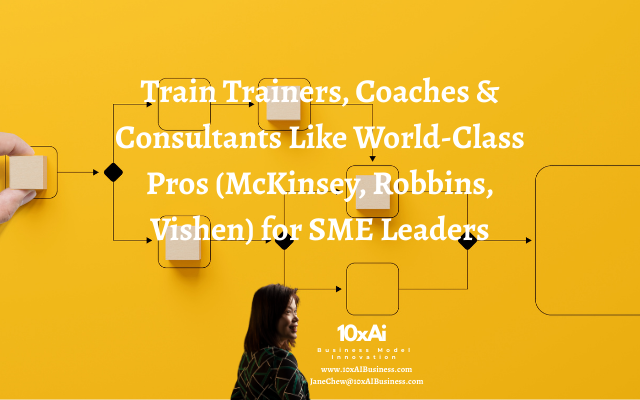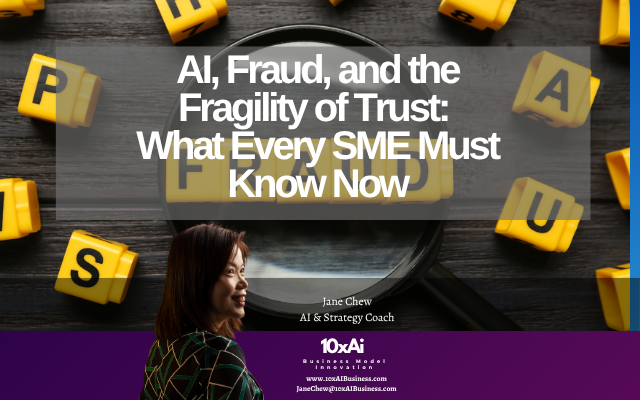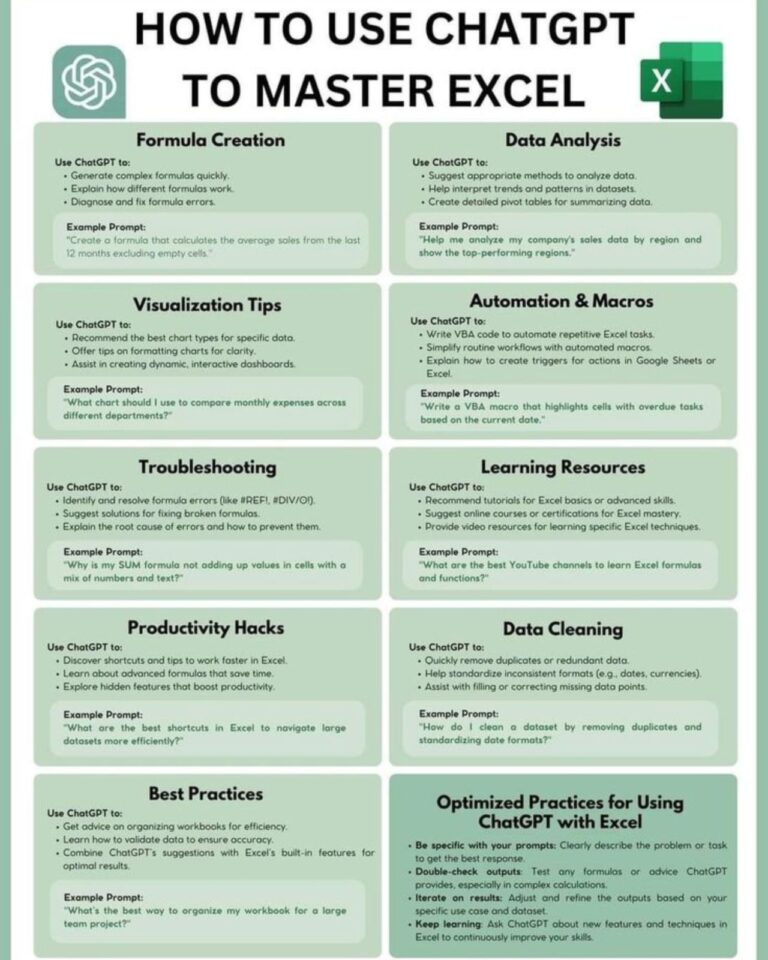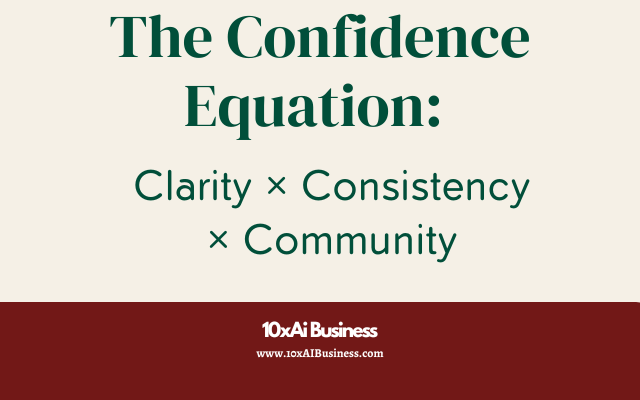How to Train Trainers, Coaches & Consultants to Serve Business Owners Like World-Class Pros
Who This Is For
Training providers, independent coaches, and boutique consultants who work with SME owners and leadership teams—and want to deliver at the level of top-tier firms and world-class coaches while staying practical, human-centric, and ROI-driven.
Learning Outcomes
- Structure any business problem and drive to a clear, prioritized recommendation.
- Coach for real behavior change (individuals and teams) with measurable outcomes.
- Embed inner-game practices to sustain performance, clarity, and resilience.
- Produce client-ready artifacts: diagnostic, storyline, straw-man deck, roadmap, OKRs.
- Leverage an AI knowledge base to accelerate research, synthesis, and coaching prep.
The Blended Methodology (3 Pillars)
- Strategy Consulting — Structure → Hypotheses → Analysis → Synthesis → Recommendation.
- Coaching Mastery — Breakthrough questioning, purpose, leadership behaviors, team trust.
- Inner Game — Mindfulness, visualization, and daily rituals to sustain focus and growth.
We combine hard frameworks (e.g., Porter, Drucker) with human change models (e.g., Robbins, Sinek) and inner-state practices (e.g., Vishen) so trainees can diagnose, influence, and sustain change—end to end.
12 Core Frameworks to Master
Consulting (Strategy & Innovation)
- McKinsey Problem-Solving: Define → Hypothesis → Analysis → Synthesis → Recommendation.
- Porter’s Five Forces: Rivalry, entrants, substitutes, buyer power, supplier power.
- Drucker’s Five Questions: Customer, value, results, plan, mission.
- Jim Collins’ Hedgehog: Passion × Best-at × Economic engine.
- Christensen’s Disruption: Underserved segments, simpler/cheaper entrants.
Coaching (Leadership & Change)
- Tony Robbins’ 6 Human Needs: Certainty, variety, significance, love/connection, growth, contribution.
- Byron Katie—The Work: 4 questions to dissolve limiting beliefs.
- Marshall Goldsmith: What got you here won’t get you there (behavior change).
- Simon Sinek—Golden Circle: Start with Why → How → What.
- Robin Sharma—5AM/20-20-20: Move, reflect, grow.
Inner Game (Focus & Energy)
- Vishen Lakhiani—6-Phase Meditation: Compassion, gratitude, forgiveness, vision, perfect day, blessing.
- Vishen—Brules: Identify and rewrite outdated cultural rules.
6–12 Week Capability Roadmap
- Week 1–2: Problem framing, MECE thinking, hypotheses. Daily inner-game primer.
- Week 3–4: Data gathering → quick-and-dirty analysis → storyline practice.
- Week 5–6: Coaching fundamentals, needs assessment, leadership habits.
- Week 7–8: Innovation & disruption cases; design a growth play for an SME.
- Week 9–10: Team trust, purpose narratives, OKRs; change roadmaps.
- Week 11–12: Client simulation: diagnostic → deck → recommendation → objections handling.
Fast-track option: 2-day intensive + pre-work (videos, readings) + 30-day post-coaching.
Practice Labs, Scripts & Prompts
Diagnostic Intake (Consulting)
Goal: Frame the problem in 15 minutes
Ask: 1) What result is slipping? 2) Where in the funnel/value chain? 3) What changed?
Decide: One priority hypothesis to test in 7 days.Breakthrough Coaching (Robbins-style)
“Which need are you meeting today in ways that serve you—and which in ways that hurt future you?
What state shift (physiology, focus, language) would make the next action feel obvious?”Vision & Purpose (Sinek-style)
“Why does this business deserve to exist—beyond money? What belief unites your team and customers?”6-Phase Micro Practice (Vishen)
1 minute each: Compassion → Gratitude → Forgiveness → Vision → Perfect Day → BlessingDelivery Models & Assets
- Workshops & Cohorts: 2-day intensive + 6-week cohort labs.
- 1:1 Executive Coaching: Leadership behaviors, OKRs, habit tracking.
- Advisory Sprints: 4–6 weeks to diagnose, prioritize, and pilot one change.
- AI-Augmented Delivery: Multi-persona chatbot (Consultant, Coach, Meditation Guide) to prep, simulate, and review.
- Client-ready Templates: Diagnostic survey, storyline outline, deck skeleton, 90-day roadmap.
Assessment, Rubrics & Certification
- Skills Rubric: framing (0–5), hypothesis quality, synthesis clarity, coaching presence, change orchestration.
- Artifacts: diagnostic report, recommendation deck, OKR plan, change comms.
- Outcomes: NPS ≥ 8, measurable KPI shift, stakeholder testimonials.
- Reflection: weekly journal (wins, stuck points, next experiments).
SME Use-Cases: From Strategy to Execution
- Revenue: ICP focus, pricing strategy, offer design, win-loss review.
- Operations: value-stream mapping, automation opportunities, SOPs.
- People: leadership behaviors, trust building, rituals, feedback loops.
- Innovation: low-risk pilots, customer co-creation, disruption watchlist.
AI Knowledge Base: How to Train Your Bot & Team
- Seed Content: Upload concise cards/playbooks for the 12 frameworks.
- Prompt Library: PRISM-style prompts for diagnostics, coaching, strategy, and inner-game.
- Personas: Consultant (McKinsey-style), Coach (Robbins/B. Katie/Sinek), Meditation Guide (Vishen).
- Workflows: Intake → Frame → Hypothesize → Analyze → Synthesize → Recommend → Coach → Track.
- Guardrails: human-in-the-loop, ethical guidelines, source transparency.
Start with lightweight knowledge cards (fast to ingest), then grow into 5–10 page playbooks with case studies and exercises.
Common Pitfalls & How to Avoid Them
- Over-theorizing: Solve one real client problem every two weeks.
- Decks without decisions: End every deliverable with 3 clear next actions.
- Coaching without metrics: Tie habits to business KPIs.
- Ignoring energy: Ritualize recovery and reflection.
- AI over-reliance: Use AI for first drafts; humans for judgment and nuance.
Metrics That Matter
- Capability: rubric scores; time-to-frame; synthesis quality.
- Client Impact: revenue/cost KPIs; cycle times; NPS; adoption rates.
- Sustainability: habit adherence; leader energy; team engagement.
FAQs
Who is this training best for?
Experienced trainers and coaches ready to add strategy depth, and consultants seeking coaching and inner-game skills.
How do I start if I have only 2 days?
Run the intensive: Day 1 (strategy + storyline), Day 2 (coaching + inner-game), then a 30-day accountability sprint.
Can we white-label the certification?
Yes—define your rubric, artifacts, and pass criteria; align to your brand and industry focus.
What about ethical AI use?
Disclose AI assistance, maintain human review, protect client data, and keep sources traceable.






